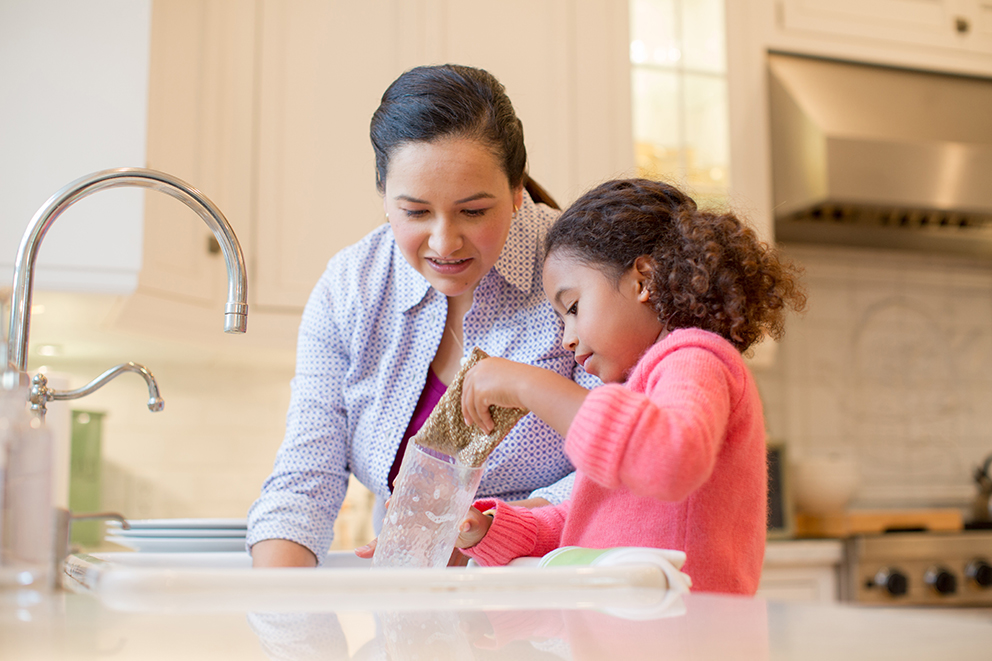The COVID-19 public health crisis has gripped the world and caused significant stress in everyone’s lives. Whether you’re working in a crowded house or coming home exhausted after a long workday, there are many benefits of a clean home.
Hear from both a Kaiser Permanente psychologist and an allergist on the best ways to achieve improved wellbeing through your personal environment.
Get Organized
If you’d like to be more productive and less stressed, then organization is key, said Alison Hu, PhD, licensed counseling psychologist at the Kaiser Permanente South San Francisco Medical Center.
“When your environment is messy, it is challenging to relax and engage in self-care, which then perpetuates feelings of anxiety,” she said.
Messiness also causes overstimulation, leading to being overwhelmed and the eventual procrastination of everyday tasks.
A tip for getting organized is to start small, Hu said. Organize one closet or room at a time, creating a designated space for items. Set aside 15 minutes a day or an hour a week for this. The accomplishment of one task can motivate you for the next.
Declutter
Excess possessions don’t make you happier; in fact, they distract from things that do, along with creating frustration and mental fatigue, according to Hu.
If an object has gone unused for 6 months or is not meaningful, give it to a charitable organization accepting donations.
Decluttering also goes for your food pantry. Clear out cabinets to make room for more essential items in case of an emergency. Food banks are currently in need of supplies, so donate non-perishable items and help those in need.
Find your local food bank here.
Disinfect
With more people at your house for longer periods of time, disinfecting surfaces and objects helps stop the spread of germs and creates peace of mind.
The Centers for Disease Control and Prevention recommends cleaning surfaces with soap and water, a diluted household bleach solution, or an approved disinfectant. Frequently disinfect high touch-items, such as phones, laptops, light switches, doorknobs, handles, and bathroom fixtures.
Vacuum and Dust
April is also allergy season. Marc Ikeda, MD, chair of allergy and immunology at the Kaiser Permanente South Sacramento Medical Center, said a weekly vacuum and dust routine reduces allergy irritants, including pollen, pet dander, dirt, and mold.
Vacuums with a HEPA (high efficiency particulate air) filter traps smaller particles than a regular filter, Dr. Ikeda said, as do those with a double thickness bag. For dusting, it’s better to wipe than to use a feather duster, which can recirculate dust in the air.
Other ways to keep seasonal allergies and asthma at bay is to take off shoes before coming inside, wipe pets’ paws after being outdoors, close windows and doors, and take nighttime showers to remove outdoor irritants.
Wash Your Bedding
Dust mites are a major contributor to year-round allergies — plus they’re just gross. They primarily live in pillows and mattresses. Dr. Ikeda said washing bedding weekly in hot water, at least 130 F, helps. If you don’t have time to wash bedding, stick it in the dryer for 15 minutes.
Create an Enjoyable Space
It’s beneficial to be mindful about your surroundings. Create a space that’s relaxing and that you like hanging out in.
“We are often mindless about how we structure our environment, but it’s important to make a space where you want to spend time,” Hu explained. “Take a few moments and consider what are some things that make you feel good.”





This Post Has 2 Comments
Thank you for refreshing the “clean” suggestions. I good reminder for us all.
Great article, and very helpful since I have severe allergies. And thank you for the suggestion of wiping my dog’s paws after being outside. I would have never thought of that!